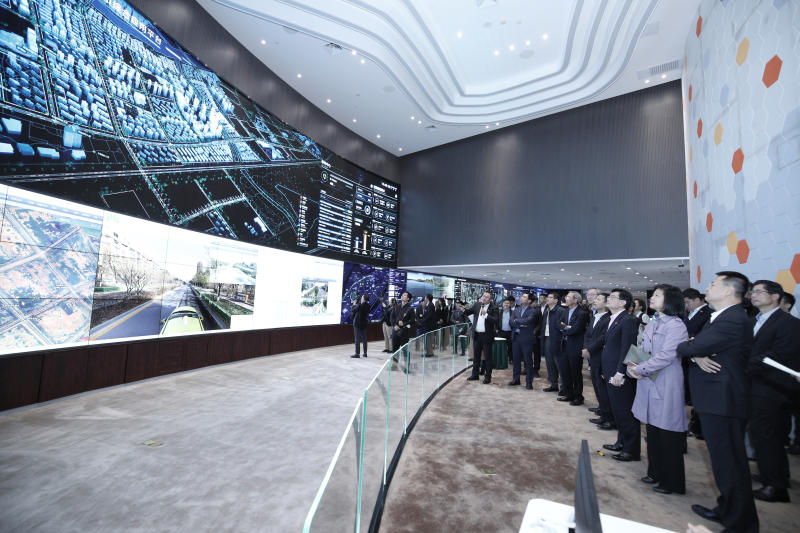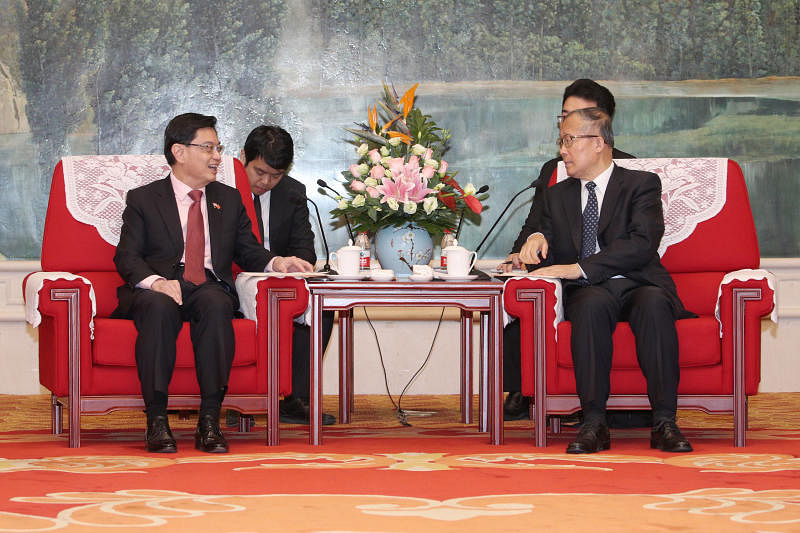Tianjin Eco-city testing ways to turn it waste-free
Sign up now: Get insights on Asia's fast-moving developments

Tianjin Eco-city's Smart City Operations Centre has been a one-stop command post to centrally monitor all public utilities infrastructure, and direct all municipal services and emergency management.
PHOTO: MCI
Follow topic:
TIANJIN - More than a decade after transforming a salt pan and wastewater pond into an eco-city of autonomous buses and green buildings, Singapore and China are now turning their second joint venture into a zero-waste city.
Tianjin Eco-city, the 11-year-old intergovernmental project between the two countries, is testing a number of waste management solutions that could eventually be brought to other Chinese cities and also back to Singapore.
China picked 16 cities to pilot its zero-waste programme in April this year, including Shenzhen, Weihai and Tianjin Eco-city.
During the trial period, which ends in December next year, it will test-bed advanced waste management technologies like on-site plastics recycling and organic waste recycling.
On his first visit to Tianjin Eco-city on Wednesday (Oct 16), Deputy Prime Minister Heng Swee Keat said he was happy to see the progress it has made after more than a decade.
"In the next phase, I think we are looking at how we can set the vision for the next level of development," he said, referring to the city's zero-waste programme.
Singapore launched its own zero-waste masterplan in August, laying out its long-term strategies in using circular economy to become a waste-free nation.
As Tianjin Eco-city aims to get greener, it also wants to become smarter. Since last year, the city's Smart City Operations Centre has been a one-stop command post to centrally monitor all public utilities infrastructure, and direct all municipal services and emergency management.
The centre crunches city-wide data on transport, energy, environment as well as information from the municipal authorities to derive patterns and preventive modelling that is used to improve the quality and efficiency of city management.
For instance, it uses a combination of Geographic Information System (GIS), drone scanning and robot surveillance data to identify areas of water leakage in its pipe network.
It has a network of sensors at its disposal, such as more than 400 street lamp posts that contain sensors and CCTV cameras to track environmental and traffic conditions.
The Eco-city has also piloted a range of smart applications, including autonomous public buses and smart carparks. It has also partnered JD.com, China's second-largest e-commerce company, to trial autonomous courier vehicles and an unmanned supermarket.
With the new developments come opportunities for Singapore companies, Mr Heng says. These could be in the areas of urban planning and design, waste management, recycling and green building.
"With the Fourth Industrial Revolution, the Internet of Things, the use of Internet software and digital technology can help us to manage cities much more efficiently. I do hope that many of our companies will take an active interest in this," he told reporters.

The eco-city will next look to replicating its sustainable-living model in other Chinese cities and even countries that have Belt and Road projects.
The Belt and Road Initiative is a signature policy of President Xi Jinping, whose vision is to recreate a 21st century Silk Road of overland corridors and shipping lanes.
On Tuesday, the two countries signed an agreement at the annual top-level Joint Council for Bilateral Cooperation meeting to apply the Tianjin Eco-city experience elsewhere.
Outlining the deal, Minister-in-charge of the Tianjin Eco-city Desmond Lee said it will also focus on joint research on green and sustainable living and training officials to plan and execute such projects.
"Each city, each country will have a different pace of development, different needs, and applying the learning from Tianjin Eco-city as well as from the joint research we're going to undertake together will allow our companies from both China and Singapore as well as other partners to be able to explore such developments in those places," he said.
On Wednesday, Mr Lee, who is Minister for Social and Family Development and Second Minister for National Development, opened the Singapore Centre, a one-stop shared office for Singapore businesses looking to have a presence in Tianjin Eco-city and the greater Tianjin area.
Besides providing them with affordable office space for rent, the centre will also help these companies with business applications and setting up.

